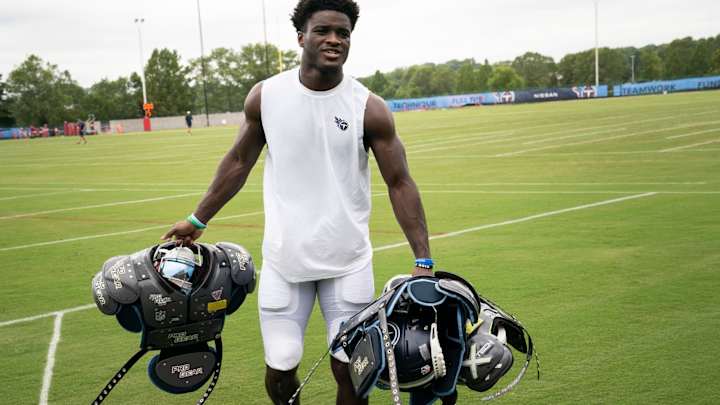McCreary Measures Up to NFL Competition

In this story:
NASHVILLE – An imposing load of a wide receiver at 6-foot-2 and 225 pounds, rookie Treylon Burks muscled into cornerback Roger McCreary yards off the line of scrimmage during a red-zone drill on Monday.
McCreary – all 5-foot-11, 190 pounds of him – gave some ground to the bigger man at first, but recovered in a split second, returning to Burks’ side at the same time Ryan Tannehill’s pass attempt arrived near the goal line.
The result? Incompletion.
It’s become an increasingly common sight during the first week of Tennessee Titans training-camp practices as McCreary has left a trail of footballs bouncing off the turf around him.
That was the case on this day in particular. McCreary broke up at least five passes throughout the practice, both team and seven-on-seven periods.
“Yeah, he’s really been competing,” Tannehill said of McCreary. “He’s a guy who’s obviously extremely talented and is going to come in and play with confidence. You feel like you’ve got an edge on him and then he finds a way to battle his way back in there, and he’s done a good job of playing the football when it’s in the area.”
In one sense, maybe we shouldn’t be surprised, considering how productive McCreary – Tennessee's second-round pick in this year's draft – was at Auburn. He intercepted six passes and knocked away 37 passes in 35 games over his last three seasons, finishing first in the SEC with 16 passes defended last year.
But there were still some questions raised as to how well McCreary would fare on the next level, considering he wasn’t especially fleet of foot (a 4.50 40-yard dash at the NFL Scouting Combine) and had relatively short arms (28 7/8 inches).
Contrast those numbers, for instance, with the Titans’ first-round draft pick from 2021, cornerback Caleb Farley. The 6-foot-2, 197-pound Farley reportedly ran a 4.3 40-yard dash while at Virginia Tech (he didn’t work out at the combine because of an injury) and has arms that stretch 33 3/8 inches.
If comparisons like that bothered McCreary in the past, however, they sure don’t seem to be concerning him in the early stages of his first NFL training camp.
“I mean, when they talk about shorter arms … I heard it when the draft came and everything, but I don’t really care now,” McCreary said. “It is just all football. It doesn’t really matter about short arms or everything. We’re just out here to play football, that’s my mentality.”
Another plus for the Titans: McCreary has not been overpowered by the team’s string of big receivers – a group that includes Burks, as well as Nick Westbrook-Ikhine (6-2, 211), Dez Fitzpatrick (6-2, 208), Racey McMath (6-3, 217) and Cody Hollister (6-4, 220) among others.
In particular, McCreary has found himself going head-to-head with fellow rookie Burks – the team’s 2022 first-round pick – on several occasions over the past few days. What looks like a physical mismatch at the line of scrimmage has been anything but once the play gets underway.
“One of my skills is to be quicker than a guy because they’re bigger and everything,” McCreary said. “That’s what I focus on, even if they push off and everything. It’s just all about me reacting fast and getting right back on their hip.”
Added coach Mike Vrabel: “I know how he did it. He’s competitive. He’s usually on body, kind of a lot of the same things we saw in the evaluation process. He rarely makes the same mistake twice.”
The Titans now have a stockpile of highly drafted cornerbacks in McCreary, Farley, Kristian Fulton (2020 second-round pick) and Elijah Molden (2021 third-round pick).
It’s easy to wonder what the corner depth chart will look like if all are healthy and at the top of their game.
But McCreary’s cause will be helped by a potential ability to play both on the outside and inside. He didn’t play much in the slot at Auburn, but both McCreary and the Titans believe he can do so if necessary.
“I feel like as a (defensive back), you have to play inside and outside,” McCreary said. “So it’s really good that I got experience (playing) inside and outside. No matter what position they put me in, I’ll be ready to play it.”
The bottom line for a cornerback: Whether you’re inside or outside, whether you’re arms or short or long, you have to find a way to force incompletions.
McCreary is doing just that so far in camp – no matter what the measurements might have forecast.
“We all want the perfect prototype at every position, right?” Ryan Cowden, the Titans’ vice president of player personnel, said. “Give me the height, the length, the speed and everything. But it's not how it goes. We don't get everything.
“If you say the short arm things followed (McCreary) around, well, how many people caught the ball on him? How many times was that a factor? How many times was he in phase at the top of the break to mirror the footwork of the receiver, so there was no window to pass the football? How good is the technique of stabbing through the pocket?”
So far, so good.
